

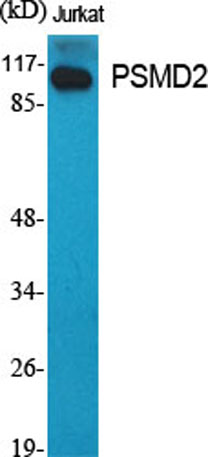
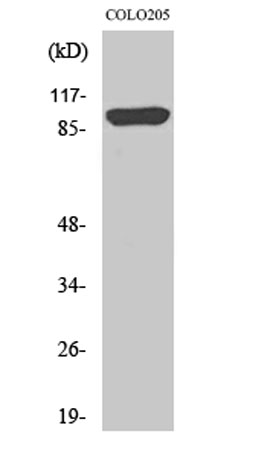
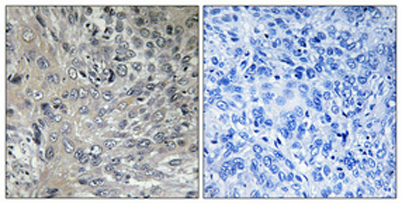
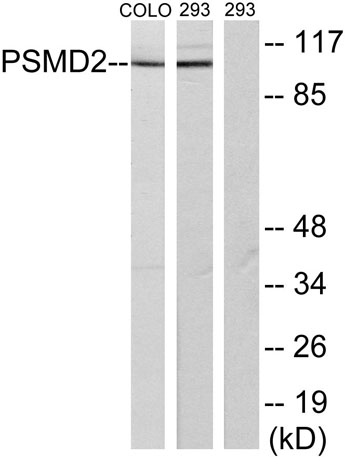
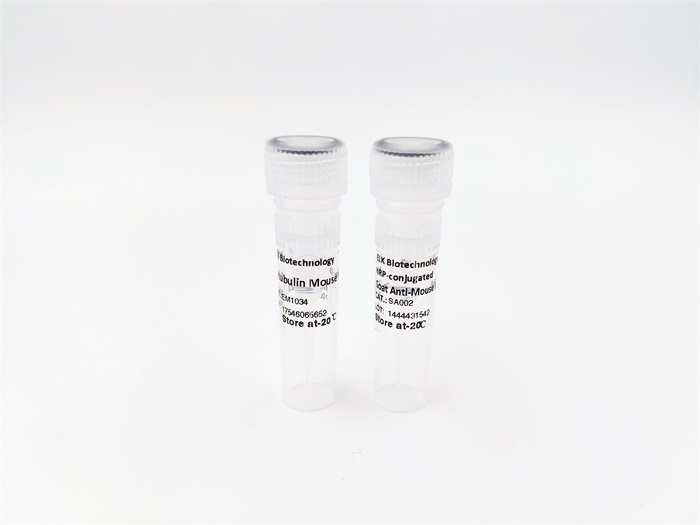



PSMD2 rabbit pAb
 One-click to copy product information
One-click to copy product information$148.00/50µL $248.00/100µL
| 50 µL | $148.00 |
| 100 µL | $248.00 |
Overview
| Product name: | PSMD2 rabbit pAb |
| Reactivity: | Human;Mouse;Rat |
| Alternative Names: | PSMD2; TRAP2; 26S proteasome non-ATPase regulatory subunit 2; 26S proteasome regulatory subunit RPN1; 26S proteasome regulatory subunit S2; 26S proteasome subunit p97; Protein 55.11; Tumor necrosis factor type 1 receptor-associated protein |
| Source: | Rabbit |
| Dilutions: | Western Blot: 1/500 - 1/2000. Immunohistochemistry: 1/100 - 1/300. Immunofluorescence: 1/200 - 1/1000. ELISA: 1/20000. Not yet tested in other applications. |
| Immunogen: | The antiserum was produced against synthesized peptide derived from human PSMD2. AA range:101-150 |
| Storage: | -20°C/1 year |
| Clonality: | Polyclonal |
| Isotype: | IgG |
| Concentration: | 1 mg/ml |
| Observed Band: | 100kD |
| GeneID: | 5708 |
| Human Swiss-Prot No: | Q13200 |
| Cellular localization: | proteasome complex,nucleus,nucleoplasm,cytosol,proteasome regulatory particle,proteasome regulatory particle, base subcomplex,membrane,proteasome accessory complex,proteasome storage granule,extracellular exosome, |
| Background: | The 26S proteasome is a multicatalytic proteinase complex with a highly ordered structure composed of 2 complexes, a 20S core and a 19S regulator. The 20S core is composed of 4 rings of 28 non-identical subunits; 2 rings are composed of 7 alpha subunits and 2 rings are composed of 7 beta subunits. The 19S regulator is composed of a base, which contains 6 ATPase subunits and 2 non-ATPase subunits, and a lid, which contains up to 10 non-ATPase subunits. Proteasomes are distributed throughout eukaryotic cells at a high concentration and cleave peptides in an ATP/ubiquitin-dependent process in a non-lysosomal pathway. An essential function of a modified proteasome, the immunoproteasome, is the processing of class I MHC peptides. This gene encodes one of the non-ATPase subunits of the 19S regulator lid. In addition to participation in proteasome function, this subunit may also participate |
-
 Western Blot analysis of various cells using PSMD2 Polyclonal Antibody
Western Blot analysis of various cells using PSMD2 Polyclonal Antibody -
 Western Blot analysis of 293 cells using PSMD2 Polyclonal Antibody
Western Blot analysis of 293 cells using PSMD2 Polyclonal Antibody -
 Immunohistochemical analysis of paraffin-embedded Human cervix cancer. Antibody was diluted at 1:100(4° overnight). High-pressure and temperature Tris-EDTA,pH8.0 was used for antigen retrieval. Negetive contrl (right) obtaned from antibody was pre-absor
Immunohistochemical analysis of paraffin-embedded Human cervix cancer. Antibody was diluted at 1:100(4° overnight). High-pressure and temperature Tris-EDTA,pH8.0 was used for antigen retrieval. Negetive contrl (right) obtaned from antibody was pre-absor -
 Western blot analysis of lysates from COLO205 and 293 cells, using PSMD2 Antibody. The lane on the right is blocked with the synthesized peptide.
Western blot analysis of lysates from COLO205 and 293 cells, using PSMD2 Antibody. The lane on the right is blocked with the synthesized peptide.

 Manual
Manual